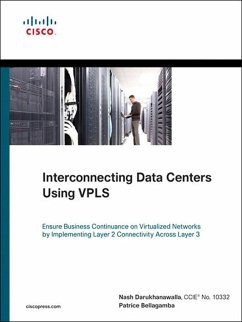As data centers grow in size and complexity, enterprises are adopting server virtualization technologies such as VMware, VMotion, NIC teaming, and server clustering to achieve increased efficiency of resources and to ensure business resilience. However, these technologies often involve significant expense and challenges to deal with complex multisite interconnections and to maintain the high availability of network resources and applications.
Interconnecting Data Centers Using VPLS presents Virtual Private LAN Service (VPLS) based solutions that provide high-speed, low-latency network and Spanning Tree Protocol (STP) isolation between data centers resulting in significant cost savings and a highly resilient virtualized network. The design guidance, configuration examples, and best practices presented in this book have been validated under the Cisco Validated Design (CVD) System Assurance program to facilitate faster, more reliable and more predictable deployments. The presented solutions include detailed information about issues that relate to large Layer 2 bridging domains and offer guidance for extending VLANs over Layer 3 networks using VPLS technology.
Implementing this breakthrough Data Center Interconnect (DCI) strategy will evolve your network to support current server virtualization techniques and to provide a solid foundation for emerging approaches. The book takes you from the legacy deployment models for DCI, problems associated with extending Layer 2 networks, through VPN technologies, to various MST-, EEM-, and GRE-based deployment models and beyond. Although this book is intended to be read cover-to-cover, it is designed to be flexible and allow you to easily move between chapters to develop the solution most compatible with your requirements.
This book is part of the Networking Technology Series from Cisco Press®, which offers networking professionals valuable information for constructing efficient networks, understanding new technologies, and building successful careers.
$60.00 USA / $72.00 CAN
Interconnecting Data Centers Using VPLS presents Virtual Private LAN Service (VPLS) based solutions that provide high-speed, low-latency network and Spanning Tree Protocol (STP) isolation between data centers resulting in significant cost savings and a highly resilient virtualized network. The design guidance, configuration examples, and best practices presented in this book have been validated under the Cisco Validated Design (CVD) System Assurance program to facilitate faster, more reliable and more predictable deployments. The presented solutions include detailed information about issues that relate to large Layer 2 bridging domains and offer guidance for extending VLANs over Layer 3 networks using VPLS technology.
Implementing this breakthrough Data Center Interconnect (DCI) strategy will evolve your network to support current server virtualization techniques and to provide a solid foundation for emerging approaches. The book takes you from the legacy deployment models for DCI, problems associated with extending Layer 2 networks, through VPN technologies, to various MST-, EEM-, and GRE-based deployment models and beyond. Although this book is intended to be read cover-to-cover, it is designed to be flexible and allow you to easily move between chapters to develop the solution most compatible with your requirements.
- Describes a variety of deployment models to effectively transport Layer 2 information, allowing your virtualization solution to operate effectively
- Explains benefits and trade-offs of various solutions for you to choose the solution most compatible with your network requirements to ensure business resilience
- Provides detailed design guidance and configuration examples that follow Cisco best practice recommendations tested within the CVD
This book is part of the Networking Technology Series from Cisco Press®, which offers networking professionals valuable information for constructing efficient networks, understanding new technologies, and building successful careers.
$60.00 USA / $72.00 CAN
Dieser Download kann aus rechtlichen Gründen nur mit Rechnungsadresse in A, B, BG, CY, CZ, D, DK, EW, E, FIN, F, GR, HR, H, IRL, I, LT, L, LR, M, NL, PL, P, R, S, SLO, SK ausgeliefert werden.


